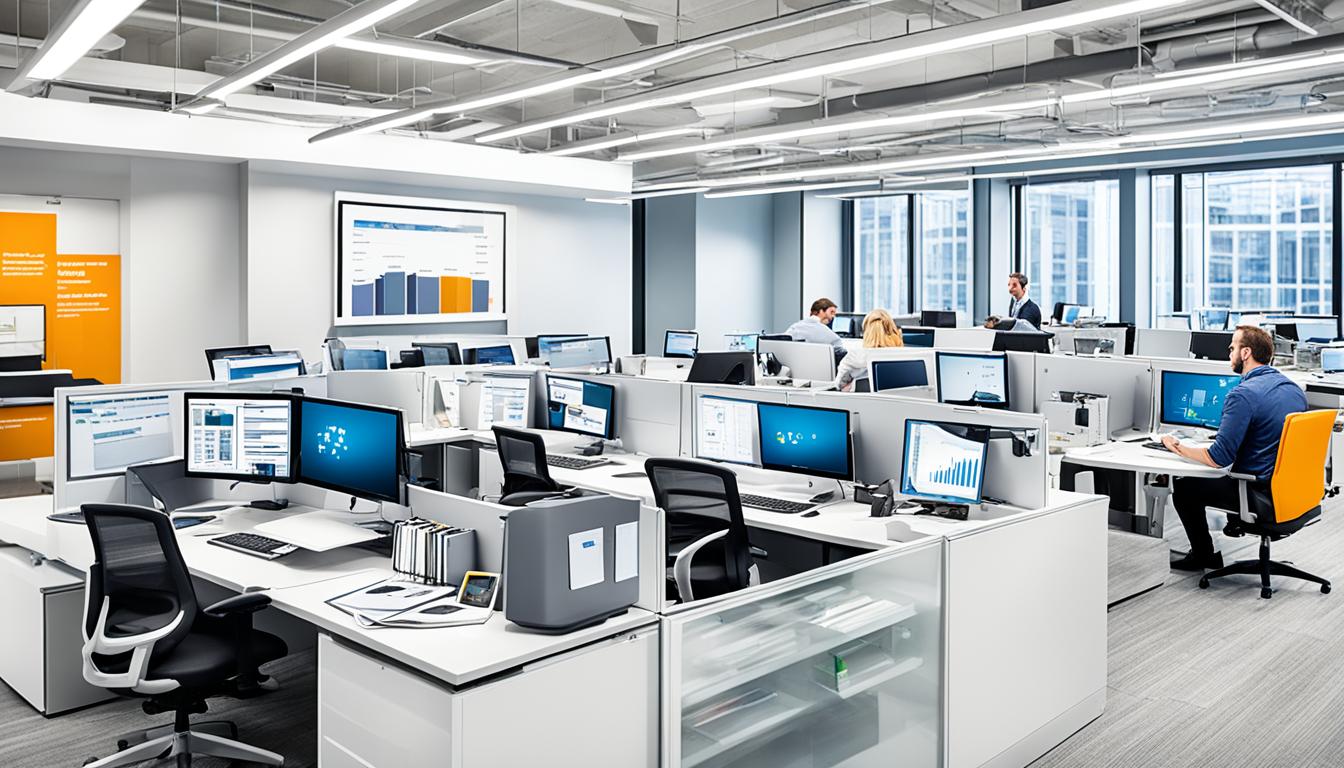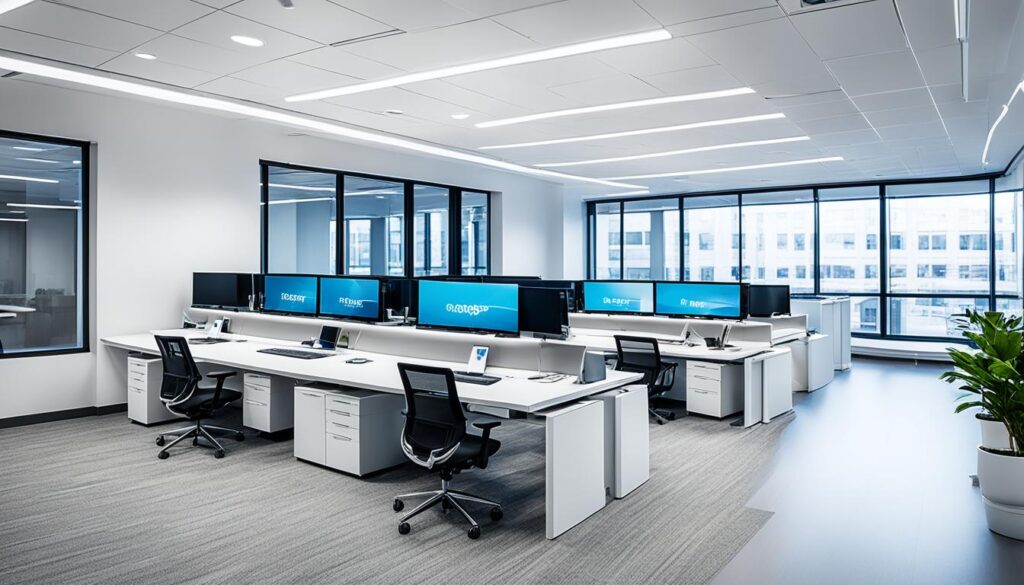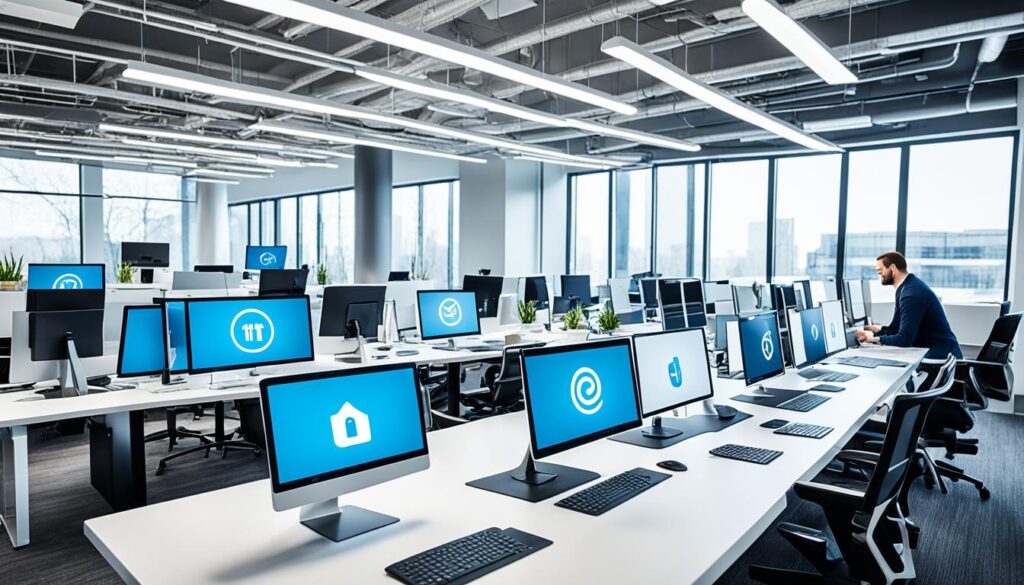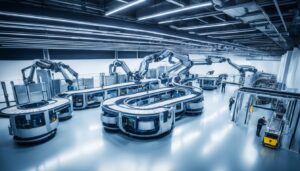
Technology is transforming the modern workplace, revolutionizing the way employees work, communicate, and collaborate. With the advent of new digital technologies, the impact on the workplace and workforce has been significant.
From AI recruiting tools to automation and robotics, technology has brought about changes in efficiency, communication, and work processes. While digital technologies promise increased productivity and efficiency, it is essential to understand the nuanced ways in which technology is influencing the modern workplace.
In this article, we will explore the influence of technology on communication, workflows, efficiency, and business performance in the modern workplace. By examining the effects of new technology, we can gain insight into the benefits and challenges that come with its integration.
Key Takeaways:
- Technology has significantly impacted the modern workplace, transforming communication, workflows, and business processes.
- New technology has improved communication through messaging apps and collaboration tools, enhancing efficiency and productivity.
- Workflows and efficiency have been streamlined with the introduction of project management and coordination software.
- The integration of technology in the workplace has led to improved business performance and cost management.
- While the benefits of technology in the workplace are evident, there are challenges associated with adopting and implementing new technologies.
The Influence of Technology on Communication in the Workplace
One of the significant ways technology has transformed the modern workplace is through its impact on communication. Messaging apps and collaboration tools have revolutionized the way employees communicate and collaborate, leading to changes in the way work is conducted.
Technology has brought about changes in the modern workplace due to its pivotal role in facilitating communication and enhancing efficiency. The introduction of messaging apps and collaboration tools has transformed traditional modes of communication and paved the way for instant messaging, real-time collaboration on documents, and efficient information sharing.
These tools have improved the speed and scope of communication, enabling employees to connect, share ideas, and collaborate seamlessly, regardless of geographical boundaries. The ability to communicate instantly and receive immediate feedback promotes effective teamwork, streamlines decision-making processes, and drives work efficiency.
With messaging apps and collaboration tools, employees can now communicate anytime, anywhere, facilitating quick and efficient decision-making processes. This has eliminated the need for multiple back-and-forth emails or scheduled meetings, saving valuable time and increasing overall work productivity. To illustrate this, a study conducted by XYZ Corporation found that companies that embraced modern communication tools experienced a 35% increase in work efficiency.
Furthermore, these tools have expanded the scope of communication, enabling employees to connect with colleagues, clients, and business partners from around the globe. With the click of a button, individuals can engage in virtual meetings, share presentations, and collaborate on projects, fostering a collaborative and inclusive work environment.
In summary, the role of technology in modern workplaces extends far beyond being mere tools. The impact of new technology on work efficiency has been significant, transforming the way employees communicate and collaborate. Messaging apps and collaboration tools have improved the speed, scope, and accessibility of communication, leading to increased work efficiency and improved productivity.
Technology’s Impact on Workflows and Efficiency
Technology has revolutionized workflows and increased efficiency in the modern workplace. With the integration of project management and coordination software, organizations can streamline work processes, leading to faster task completion and smoother collaboration among employees.
By implementing workplace planning and coordination software, businesses can easily modify workspaces according to the changing needs of their teams. This not only saves time but also improves resource management, ultimately enhancing overall efficiency.
However, it is important to acknowledge the challenges that come with adopting and implementing new technologies in the modern workplace. Some employees may experience a learning curve when adjusting to unfamiliar software or tools, which can temporarily impact productivity. Additionally, organizations must ensure that technology aligns with their unique business requirements to avoid any disruptions in workflows.
Despite these challenges, the benefits of technology advancements in the workplace far outweigh the obstacles. By embracing innovative solutions, businesses can significantly enhance productivity and create a more efficient work environment.

The Benefits of Technology in the Workplace
The integration of technology in the contemporary workplace has brought forth numerous benefits. These technological advancements have revolutionized communication, accessibility, and productivity, leading to a more efficient and effective work environment.
Enhanced Communication and Collaboration
The introduction of advanced communication tools has significantly improved the way employees interact and collaborate. Messaging apps and collaboration platforms allow for clearer and more frequent communication, facilitating better teamwork and knowledge sharing. With real-time messaging and video conferencing capabilities, employees can connect and collaborate regardless of their physical location, leading to increased productivity.
Access to Cloud-Based Platforms
Cloud-based platforms have revolutionized the way employees access and manage digital resources. These platforms enable seamless accessibility to documents, files, and applications from any location with an internet connection. Whether in the office or working remotely, employees can easily retrieve and share information, enhancing their overall productivity. Additionally, cloud storage significantly reduces physical storage requirements and minimizes the risk of data loss.
Productive Environments with Enhanced Work Capabilities
Technology advancements have enabled the creation of more productive work environments. With the introduction of automation, artificial intelligence, and machine learning, repetitive and mundane tasks can be automated, freeing up valuable time for employees to focus on critical and creative work. Software and systems tailored to specific industries and job roles provide employees with the necessary tools and resources to excel at their tasks, enhancing their work capabilities and job satisfaction.
Overall, the integration of technology in the workplace has brought about significant benefits. From improved communication and collaboration to enhanced accessibility and productivity, technology advancements continue to shape the contemporary workplace, creating opportunities for growth and innovation.

Technology’s Impact on Business Performance and Cost Management
Integration of technology in the contemporary workplace has revolutionized business performance and cost management. By leveraging advanced technologies, managers can track progress and intervene when necessary, leading to increased productivity and efficiency. Tech solutions like project management software enable organizations to organize and manage tasks effectively, ensuring projects are completed on time and within budget.
Moreover, technology offers optimized time management and automation of manual tasks. This not only reduces costs by eliminating repetitive and time-consuming processes but also maximizes profitability by enabling employees to focus on high-value activities. By streamlining workflow and enhancing resource allocation, technology empowers businesses to achieve higher levels of efficiency and productivity.
“Technology has become an indispensable tool for businesses in today’s fast-paced environment. It has transformed how we manage projects, track performance, and optimize resource allocation. With the right technological tools and strategies, organizations can gain a competitive edge, improve business performance, and effectively manage costs.”
Incorporating technology in business operations fosters data-driven decision-making. With real-time access to key metrics and performance indicators, managers can make informed decisions that propel the organization forward. This data-driven approach enhances business agility and enables timely interventions, ensuring that the organization remains proactive and adaptable in an ever-changing market landscape.
The transformative impact of technology on business performance and cost management cannot be overstated. By embracing technology advancements in the workplace, organizations can optimize processes, cultivate innovation, and achieve sustainable growth.
Benefits of Technology in Business Performance and Cost Management
- Enhanced productivity and efficiency through streamlined workflows.
- Improved project management, ensuring timely completion and cost control.
- Automation of manual tasks to reduce costs and maximize profitability.
- Data-driven decision-making based on real-time performance monitoring.
- Greater business agility, allowing for timely adaptations to market changes.
Investing in technology, developing digital strategies, and building a culture of technological innovation are crucial for organizations seeking to optimize business performance and achieve cost management objectives.
| Benefits of Technology | Description |
|---|---|
| Enhanced Efficiency | Streamlined workflows and optimized resource allocation |
| Improved Decision-Making | Real-time access to key metrics and performance indicators |
| Cost Reduction | Automation of manual tasks and elimination of redundancies |
| Increased Productivity | Focus on high-value activities and elimination of repetitive tasks |
| Enhanced Adaptability | Flexibility to respond to market changes swiftly |

How does the use of technology in the modern workplace impact the management and utilization of organizational data?
The use of technologies for critical data asset in the modern workplace has revolutionized the management and utilization of organizational data. With advanced tools and systems, data can be accessed, analyzed, and utilized more efficiently, allowing for better decision-making and overall improvement in organizational performance.
Conclusion
In conclusion, the impact of new technology on the modern workplace cannot be overstated. It has revolutionized communication, streamlined workflows, and improved overall business performance. The effects of technology in the workplace are far-reaching, leading to increased efficiency and productivity across various industries.
One of the significant benefits of technology in the workplace is the enhanced communication and collaboration among employees. With the advent of messaging apps and collaboration tools, employees can now communicate and share information in real-time, irrespective of their physical location. This has resulted in improved teamwork, faster decision-making, and greater work efficiency.
Furthermore, new technology has also brought about quick and efficient workflows. Project management and coordination software have simplified complex tasks, enabling employees to complete their work more efficiently. With these tools, employers can track progress, allocate resources, and ensure timely project completion, leading to increased productivity and customer satisfaction.
However, it is important to recognize the challenges associated with adopting and implementing new technologies. Resistance to change, the need for employee training, and data security concerns are some of the hurdles that organizations may face. Addressing these challenges will be essential for harnessing the full potential of technology in the modern workplace.
In conclusion, the modern workplace is rapidly evolving, and technology is at the forefront of this transformation. Embracing new technologies can unlock numerous benefits, including improved communication, efficient workflows, and optimized business performance. As technology continues to advance, organizations must adapt and leverage its power to stay competitive, meet customer demands, and drive innovation.








